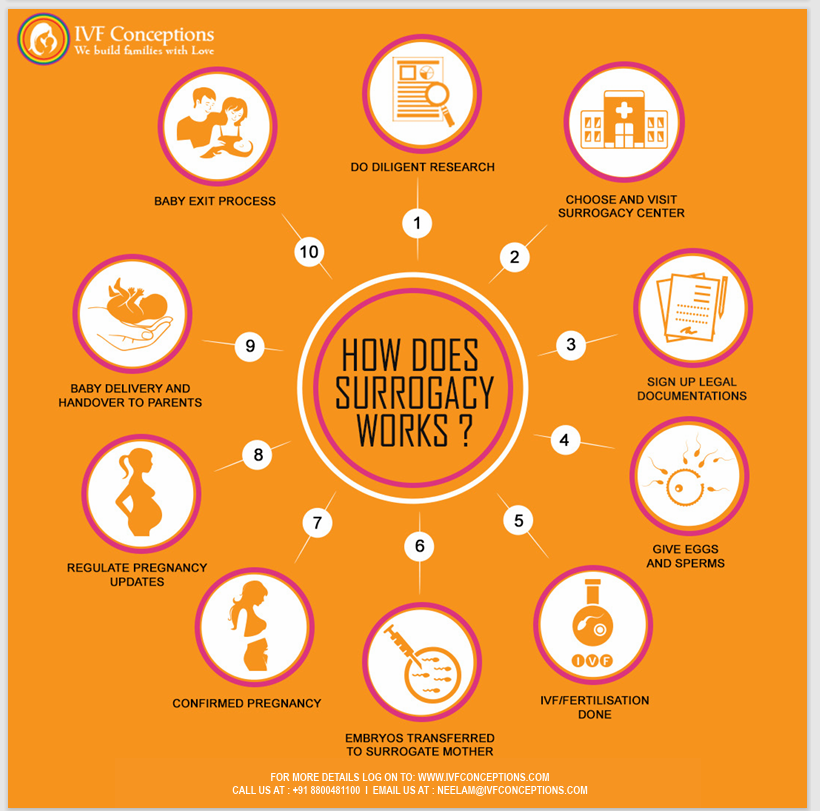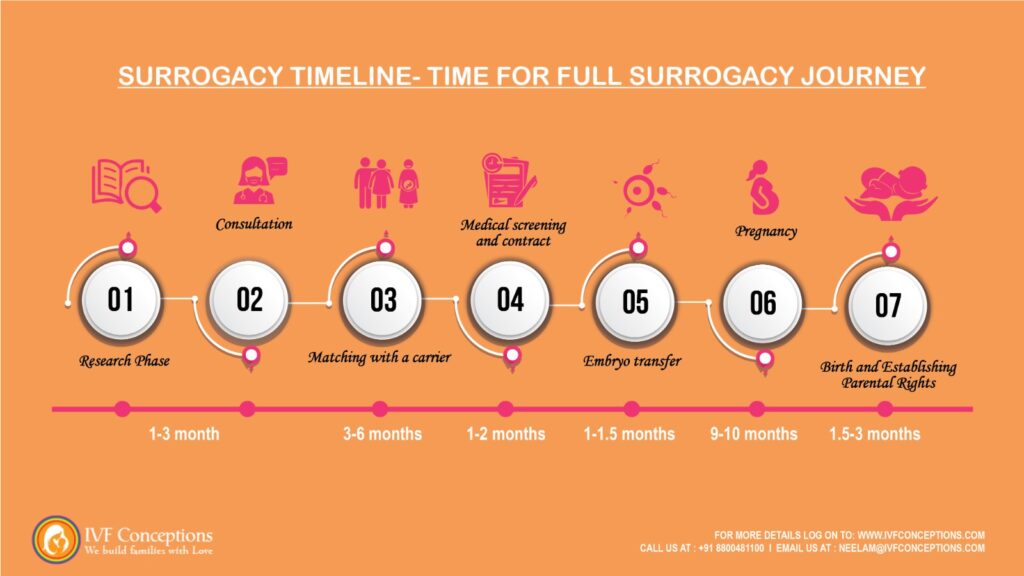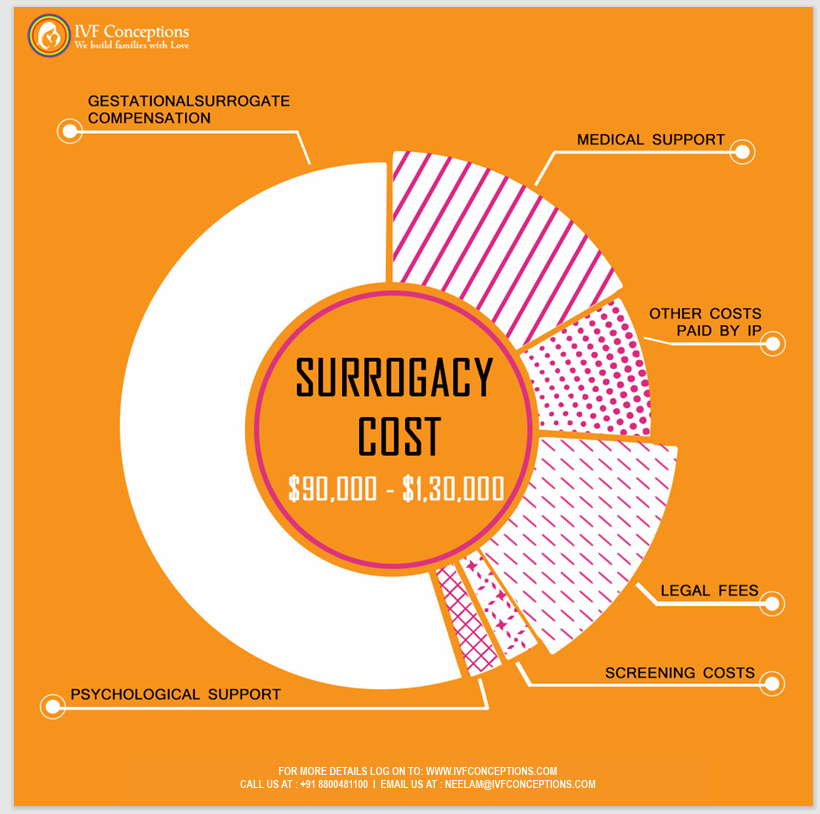Exploring the Definitions, Process, Cost, and Legal Aspects: Surrogacy offers a lifeline for intended parents who, for various reasons, are unable to start or expand their families on their own. Whether due to medical complications, fertility issues, same-sex partnerships, or other circumstances.

Surrogacy? A comprehensive guide for Intended Parents and Surrogate Mothers.
Surrogacy, a method of assisted reproduction, has become a widely debated and controversial topic in recent years. It is a process where a woman carries a pregnancy for another person or couple, known as the intended parents, who are unable to conceive or carry a child on their own. While the concept of surrogacy may seem simple, there are many complex aspects to consider, including definitions, processes, costs, and legal implications.
Book an online appointment: Get a free online consultation.
Call\W:+91-8800481100 Email:neelam@ivfconceptions.com
In this article, we will delve into the world of surrogacy, exploring the various definitions and types, the step-by-step process, the financial aspects involved, and the legal considerations that come with this method of building a family. By understanding the intricacies of surrogacy, we can gain a deeper insight into this often misunderstood practice and the experiences of the individuals involved.
Whether you are considering surrogacy as a potential option for starting a family or simply seeking to broaden your knowledge on the subject, this article aims to provide a comprehensive overview of surrogacy and its various components.
Summary of Key Points
- Surrogacy is a form of third-party reproductive practice where intended parents contract a surrogate mother to carry and give birth to a child on their behalf.
- The most common type of surrogacy in the U.S. involves creating an embryo using the egg of the intended mother or a donor and the sperm of the intended father or a donor.
- It gives an opportunity to childless couples who have failed to achieve parenthood despite years of infertility struggles. Surrogacy for gay men is the only way of growing families.
- Assisted reproduction technique (ART) and third-party reproduction play an important role in making any surrogacy process successful.
- The surrogacy process offers the opportunity to build families, create lifelong bonds, and fulfill the dreams of intended parents. It requires professional guidance, legal support, and emotional understanding.
Additional Resources:
How Does Surrogacy Process Work?
Infertility Treatment and Surrogacy Process
Surrogacy Definition and How Does Surrogacy Work?
Surrogacy is an incredible method of assisted reproduction that offers hope and the opportunity to build a family when traditional means may not be feasible. It involves a collaborative journey between intended parents ( also known as commissioning parents) and a surrogate ( also known as a gestational carrier) who selflessly carries and nurtures the baby(ies) until birth.
Gestational surrogacy is a type of surrogacy where the surrogate is also known as the carrier of the pregnancy for infertile couples and gay couples. She is not genetically related to the baby because she did not provide her eggs for fertilization. In gestational surrogacy, either the intended parent’s egg or a donor egg is used to create the embryo. The gestational surrogate then carries the pregnancy to term and gives birth to the baby on behalf of the intended parents.
Intended parents who choose surrogacy embark on a remarkable journey of hope, trust, and collaboration with the gestational surrogate. They form a strong bond, working together closely throughout the pregnancy and beyond. It’s not uncommon for lifelong connections to form between surrogates and intended parents, as they navigate the intricacies of this life-changing parenthood journey.
Types of Surrogacy
*Gestational Surrogacy
Gestational surrogacy, also known as IVF surrogacy or host surrogacy, is a common and successful form of surrogacy. In gestational surrogacy, an embryo created through in vitro fertilization (IVF) is transferred to the gestational surrogate’s uterus. Since the embryo is not genetically related to the surrogate, this method allows individuals or couples to have a biological connection to the child. Gestational surrogacy has higher success rates compared to traditional surrogacy and it is most widely used in countries where surrogacy is allowed.
*Traditional Surrogacy
In traditional surrogacy arrangements surrogate uses her own eggs and is artificially inseminated with the intended father’s sperm, is less common and has lower success rates compared to gestational surrogacy. The success of traditional surrogacy depends on various factors, including the fertility of the surrogate and the quality of her eggs.
*Commercial Surrogacy (Paid Surrogacy)
Commercial surrogacy is when the surrogate gets paid for the time and effort she gives for the surrogacy process. The surrogate compensation may vary depending on the state and country. Not all countries allow paid or compensated surrogacy. Commercial surrogacy is legal in the United States, Ukraine, Georgia, and Greece. Commercial surrogacy is usually managed by surrogacy agencies.
*Altruistic Surrogacy (Unpaid Surrogacy)
In altruistic surrogacy contracts the surrogate is not compensated more than her own out-of-pocket expenses before and during the pregnancy. One of the biggest drawbacks of altruistic surrogacy is that it takes a long time to find qualified surrogates. Countries that offer altruistic surrogacy are the United Kingdom, Australia, and Canada.
*Independent surrogacy ( where IPs do not use surrogacy agency services)
In Private surrogacy or “Indy surrogacy” the intended parents are responsible for their surrogacy journey and take care of surrogate mother recruitment and management themselves. It might save surrogacy agency fees, which can be up to $40,000, but the would-be parents need to be much more involved in terms of time, emotionally, and managing their surrogacy journey without support or guidance. Navigating the surrogacy process is financially and emotionally challenging, so having someone with you as a team can help. You might consider using customized services from the agency.
What is the surrogacy process?
The surrogacy process involves several steps and can be both medically and legally complex.
Here’s an overview of the surrogacy process based on the search results:
- Initial Considerations and Decision: The first step in the surrogacy process is for the intended parents to carefully consider their options and make the decision to pursue surrogacy. This decision often involves extensive emotional and practical considerations.
- Finding a Surrogate: Intended parents can find a surrogate through surrogacy agencies or by asking someone they know to be a surrogate. The matching process is important, and compatibility factors such as values, religious beliefs, and ideas about a healthy pregnancy are considered.
- Medical and Psychological Screening: Surrogates undergo medical and psychological screenings to ensure their suitability for the surrogacy process. Medical screenings may include a physical exam, Pap smear, and infectious disease screening. Intended parents may also undergo mental health screenings.
- Legal Considerations: Legal agreements between the intended parents and the surrogate are crucial in surrogacy. Attorneys experienced in surrogacy laws draft contracts that outline the rights and responsibilities of all parties involved. The specifics of the legal process can vary from state to state.
- Medical Procedures: In gestational surrogacy, the intended parents’ or donors’ eggs and sperm are used to create embryos through in vitro fertilization (IVF). The embryos are then transferred to the surrogate’s uterus through a medical procedure. Medications and regular monitoring are involved to optimize the chances of pregnancy.
- Pregnancy and Prenatal Care for the Surrogate: Throughout the pregnancy, the surrogate receives medical care, and the intended parents provide emotional and logistical support. Intended parents may need to be present for the birth and take responsibility for their baby immediately after delivery.
- Birth and Post-Birth Legal Processes: The birth and gaining the legal parentage of the baby is the last stage. If you are doing international surrogacy then you might like to consider citizenship status and travel documents to bring the baby back.
Why choose surrogacy to grow your family?
Over the years, surrogacy has emerged as an increasingly popular option for couples and same-sex men seeking to grow their families. It offers unique advantages and opportunities that make it an appealing choice. Let’s explore some of the reasons why people choose surrogacy to fulfill their dream of having children. Here are some requirements for surrogacy:
- Biological Connection: With advancements in in vitro fertilization (IVF), gestational surrogacy has become a safe and viable option for families who desire a biological connection with their child. By utilizing the intended parent’s or a donor’s egg and the intended parent’s sperm, surrogacy allows for the creation of a biological child.
- Overcoming Fertility Challenges: Surrogacy provides hope for childless couples who face fertility challenges or medical conditions that prevent them from carrying a pregnancy themselves. It offers a solution for those who may have exhausted other assisted reproductive technologies without success.
- LGBT Parenthood: Surrogacy offers same-sex couples the opportunity to become parents and share a genetic connection with their child. For gay couples, surrogacy can involve the use of donor eggs and either one partner’s sperm or a donor’s sperm, enabling them to have a biological child.
- Medical Considerations: Surrogacy can be a suitable option for hetero couples who have undergone medical treatments or surgeries that make carrying a pregnancy risky or impossible. It allows them to experience the joys of parenthood without compromising their health.
- Emotional Connection: Surrogacy often involves the formation of deep and meaningful connections between intended parents and their gestational surrogates. Many surrogates become cherished members of the extended family, forging lifelong bonds with the intended parents.
While surrogacy offers tremendous benefits, it’s important to consider the financial aspect. The costs associated with surrogacy can vary and include surrogate compensation, medical expenses, legal fees, psychological counseling, and more. Understanding the financial commitments involved is crucial when considering surrogacy as an option.
Parties Involved in Surrogacy: Intended Parents, Surrogate Mother, and Donors
Surrogacy is a complex reproductive arrangement that involves multiple people coming together to help create a family. Let’s explore the key parties involved in surrogacy: intended parents, surrogate mothers, and donors.
Besides these three parties, an IVF doctor/fertility specialist, reproductive lawyers, and a surrogacy agency team help all the parties to navigate the process of surrogacy.
Key parties involved in the surrogacy process:
Term | Definition | Role in Surrogacy Process |
Intended Parent(s) | The person/couple who will raise the child born through surrogacy. Usually they cannot have a child themselves due to fertility issues. | Provide sperm/egg. Undergo IVF and create an embryo. Cover medical and other costs for surrogacy. Take custody of baby after birth. |
Gestational Carrier / Surrogate | The woman who carries the pregnancy and gives birth to the child. | Must meet health requirements. Undergoes IVF, doctor visits. Carries pregnancy, gives birth to a child, and hands over the baby to intended parents. |
IVF Clinic | Medical facility that collects eggs and sperm and facilitates embryo creation via in-vitro fertilization. Transfers embryo into surrogate’s uterus. | Extracts eggs from intended mom or egg donor. Collects sperm samples from intended dad or sperm donor. Fertilizes eggs, and stores embryos until ready for transfer into the surrogate’s uterus. |
Surrogacy Agency | Optional organization that facilitates match between intended parents and surrogates. Guides parties through legal process. | Screens, contracts surrogates. Matches with intended parents. Supports both parties through all medical, emotional, and legal aspects. |
Lawyer | Specializes in surrogacy arrangements, drafts legal contracts outlining compensation, parental rights, etc. May facilitate other legal proceedings before/after birth. | Creates customized surrogacy contracts for parties outlining rights, responsibilities, and compensation. May arrange other legal affairs like establishing intended parents’ rights after birth, citizenship papers, etc.. |
- Intended Parents: The intended parents are individuals or couples who are unable to conceive or carry a pregnancy themselves and seek the assistance of a surrogate mother to have a child.
- Surrogate Mothers: The surrogate mother, also known as the gestational carrier, plays a pivotal role in the surrogacy journey. In gestational surrogacy, the surrogate mother carries and nurtures the pregnancy on behalf of the intended parents.
- Egg/Sperm Donors: In some cases, intended parents may require the use of donated gametes (eggs or sperm) to create an embryo for transfer to the surrogate mother’s uterus. Mostly egg donors are used for the surrogacy process due to the advanced age of female partners and in the case of gay couples. Donors can be known or anonymous individuals who generously contribute their reproductive cells to help individuals or couples achieve their dream of having a child.
More resources:
What is Gestational Surrogacy- Comprehensive Guide
Choosing Between International and Domestic Surrogacy
Infertility Treatment and Surrogacy Process
What are Surrogate Mother Requirements
Navigating surrogacy laws: legal considerations, rights, responsibilities.
When considering surrogacy, it is essential to navigate the legal landscape that governs this practice. Surrogacy laws can vary significantly from one jurisdiction to another, impacting the rights and responsibilities of all parties involved.
It is crucial to understand the legal considerations surrounding surrogacy, including the eligibility criteria for intended parents and surrogates, the establishment of parental rights, and the necessary legal agreements. Navigating surrogacy laws requires careful attention to detail and compliance with specific legal requirements to ensure the protection of everyone involved.
Consulting with experienced legal professionals specializing in reproductive law can provide invaluable guidance throughout the process, ensuring that all legal aspects are properly addressed and met.
Additionally, surrogacy raises various legal and ethical considerations that must be carefully addressed to ensure the well-being of all parties involved. Let’s explore some of these considerations:
- Legal Framework: Surrogacy arrangements are governed by laws and regulations that differ across countries and jurisdictions. The legal status of surrogacy, the rights and responsibilities of the parties involved, and the process of establishing parentage can vary significantly. It is essential for intended parents, surrogate mothers, and donors to understand and comply with the relevant legal requirements to protect their interests and ensure the legality of the surrogacy arrangement.
- Informed Consent: In surrogacy, all parties involved must provide informed consent, fully understanding the implications, risks, and responsibilities associated with the process. Surrogacy arrangements should be entered into willingly and voluntarily, with clear communication and understanding between the intended parents and the surrogate mother.
- Exploitation and Payment: The issue of payment and compensation in surrogacy raises ethical concerns. While surrogate mothers may receive financial compensation for their services, it is crucial to ensure that they are not exploited and that their rights and well-being are protected. Fair and transparent compensation practices, including appropriate medical and psychological support, should be in place to safeguard the interests of surrogate mothers.
- Child Welfare and Best Interests: The welfare and best interests of the child born through surrogacy are paramount. Legal frameworks and ethical considerations should prioritize the well-being and rights of the child, ensuring that they are not treated as commodities and that their long-term interests are safeguarded.
- Emotional and Psychological Support: Surrogacy can have emotional implications for all parties involved. Intended parents, surrogate mothers, and egg donors may experience a range of emotions throughout the process. Adequate emotional and psychological support should be provided to ensure the well-being and mental health of everyone involved.
- International and Cross-Border Surrogacy: Surrogacy arrangements that involve overseas surrogacy and may be introduced to additional legal and ethical complexities. In the absence of international regulations, potential challenges may arise regarding citizenship, parentage recognition, and the protection of the rights of all parties involved.
How much does surrogacy cost?
The cost of surrogacy can vary significantly depending on various factors, including the location, the type of surrogacy (traditional or gestational), the specific services and agency fees involved, medical expenses, legal fees, insurance, and additional circumstances. The typical surrogacy cost in the USA is between $150,000 to $180,000.
If you are looking for affordable yet legal surrogacy countries then Eastern European countries like Ukraine and Georgia are good to consider. The surrogacy cost is between 60,000 USD to 70,000 USD for a guaranteed surrogacy baby plan. Latin American countries like Colombia Argentina and Mexico offer the cheapest surrogacy countries for gay couples. Mexico is one of the best countries for surrogacy for all family types. The cost of overseas surrogacy is almost 70% less than US surrogacy cost.
It is advisable for intended parents to thoroughly research and consult with surrogacy agencies, fertility clinics, legal professionals, and financial advisors to understand the specific costs involved and create a realistic budget for their surrogacy journey.
Cheapest countries for surrogacy:
Country | Regulation & Organization | Who are allowed to participate | Surrogacy Cost | Legal Assurance |
Colombia | Altruistic | Singles, gay couples, hetero couples | Affordable $70,000 | Reliable |
Mexico | Altruistic | Singles, gay couples, hetero couples | Affordable $70,000 to $80,000 | Reliable |
USA | Commercial | Singles, gay couples, hetero couples | Costly $150,000+ | Strong |
Ukraine | Commercial | Hetero couples | Affordable $60,000 | Strong |
Georgia | Commercial | Hetero couples | Affordable $60,000 | Strong |
Greece | Altruistic | Hetero couples and single women | Affordable $80,000 | Strong |
Understanding the financial aspects of surrogacy is crucial in ensuring that all expenses are budgeted for and that the process moves forward smoothly, minimizing any financial burdens or surprises along the way.
Benefits and Challenges of Surrogacy
It is done correctly; a surrogacy process is beneficial to all parties. Here are some of the benefits associated with surrogacy:
Benefits of Surrogacy: Biological Connection, Emotional Bond, and Family Creation
- Genetic Connection: Gestational surrogacy allows individuals and couples to maintain a genetic connection with their offspring.
- Parenthood: Surrogacy provides a pathway to parenthood for individuals or couples who may otherwise be unable to have children on their own. It offers an opportunity to experience the joys of raising a child and building a family.
- Emotional Fulfillment: For individuals or couples longing to have children, surrogacy can bring emotional fulfillment and a sense of completeness to their lives. It allows them to fulfill their desire to become parents and share the experience of pregnancy and childbirth.
- Control and Involvement: Surrogacy offers intended parents the ability to have control and involvement throughout the entire process. They can actively participate in the selection of the surrogate, be involved in prenatal care, and build a relationship with the surrogate, creating a collaborative and supportive environment for all parties involved.
- Surrogates’ Empowerment: Surrogacy can also empower women who choose to become surrogates. It provides them with an opportunity to help others by carrying a pregnancy for those who cannot do so themselves. Surrogates often find deep satisfaction in making a significant and positive impact on someone else’s life.
Challenges and Potential Risks of Surrogacy
Surrogacy, like any complex process, presents challenges and potential risks that need to be carefully considered. Here are some of the challenges and potential risks associated with surrogacy:
- Ethical and Moral Considerations: One of the most common issues is ethical and moral concerns, as it involves the commodification of reproductive capabilities and the potential exploitation of vulnerable women. Debates exist regarding the ethics of commercial surrogacy and whether it treats the human body as a commodity.
- Health and Psychological Risks: The surrogacy process carries significant health risks for the surrogate mother. Pregnancy and childbirth always involve potential medical complications, and surrogates may face additional risks due to the use of assisted reproductive technologies.
- Expensive Process: Surrogacy is financially demanding, particularly in countries like the United States, where the cost of the process, including medical expenses, legal fees, agency fees, and compensation for the surrogate, can exceed $100,000. The high costs may limit access to surrogacy for many individuals and couples.
- Legal Complexities: Surrogacy involves navigating complex legal frameworks, and the laws surrounding surrogacy vary widely between countries and even within different jurisdictions.
- Emotional Challenges: The emotional journey of surrogacy can be challenging for all parties involved. Intended parents may experience anxiety, uncertainty, and attachment issues throughout the process. Surrogates may also face emotional complexities as they carry and give birth to a child that they will not raise as their own.
- Social Stigma and Legal Restrictions: Surrogacy faces social stigma in some cultures and societies. Additionally, legal restrictions or prohibitions on surrogacy in certain countries can limit the options available to intended parents and surrogates, potentially leading to cross-border arrangements and additional challenges.
Surrogacy Pros and Cons
While surrogacy can offer hope and fulfillment for individuals or couples struggling with infertility, it is essential to consider both the pros and cons before embarking on this journey.
- One significant advantage of surrogacy is the ability of intended parents to have a biological connection to their child, as the surrogate carries their embryo or gametes.
- Additionally, surrogacy provides an opportunity for individuals or couples to experience the joys of parenthood and create a loving family.
However, it is important to acknowledge the potential challenges and ethical concerns associated with surrogacy.
These can include the emotional complexities for all parties involved, potential legal issues, and the significant financial investment required. It is crucial to thoroughly understand and weigh these pros and cons, seeking guidance from professionals in the field to make informed decisions throughout the surrogacy process.
International Surrogacy Countries
In the realm of surrogacy, the choice of destination country is a significant consideration for intended parents. International surrogacy countries refer to those nations where surrogacy is legally regulated and accessible to individuals from around the world and is a cheaper surrogacy alternative than costly US surrogacy expenses.
Cheapest countries for surrogacy:
Country | Commercial Surrogacy | Altruistic Surrogacy | Surrogacy Status |
Australia | Prohibited | Allowed | Altruistic surrogacy is legal in all jurisdictions. Commercial surrogacy is a criminal offense. |
Canada | Banned | Allowed | Only altruistic surrogacy is permitted. Compensation for gestational carriers is limited to approved expenses. |
Colombia | Uncertain | Allowed | There are no clear rules, but altruistic surrogacy is performed and well tolerated. |
Greece | Banned | Allowed | Heterosexual couples and single females are allowed. |
India | Prohibited | Allowed | Altruistic surrogacy is permitted for certain couples based on medical and age criteria. |
Israel | Allowed | Allowed | Gestational surrogacy is legal under the Embryo Carrying Agreements Law. |
Kenya | N/A | N/A | No legal regulations/laws for surrogacy in Kenya. |
Mexico | Allowed | N/A | Surrogacy, along with ovum and sperm donation, has been legal since 1992. |
New Zealand | N/A | Allowed | Altruistic surrogacy is legal. |
Thailand | Banned | N/A | Commercial surrogacy is criminalized under the Medical Council Act. |
Ukraine | Allowed | Allowed | Surrogacy and egg/sperm donation are legal and supported by liberal laws. |
United Kingdom | N/A | Allowed | Surrogacy laws vary across different states/territories in the UK. |
United States | Varies by state | Allowed | Surrogacy laws vary by state, some are surrogacy-friendly, while others restrict or penalize commercial surrogacy. |
These countries may have varying laws, regulations, and cultural norms regarding surrogacy, making it crucial for intended parents to thoroughly research and understand the specific requirements and processes involved.
Factors to consider include the legal framework surrounding surrogacy, the availability of suitable surrogates, the medical infrastructure and expertise, as well as the cultural and logistical aspects of conducting a surrogacy journey abroad.
Intended parents should also carefully evaluate the potential risks and benefits associated with pursuing surrogacy in different international locations, seeking guidance from legal and medical professionals experienced in international surrogacy arrangements. By making an informed decision about the international surrogacy country, intended parents can navigate the process with confidence and increase their chances of a successful surrogacy journey.
Common Surrogacy Acronym and Abbreviations
As surrogacy is a medical process it might not be possible to know and understand all the terms. Here is a list of common surrogacy acronyms and abbreviations if you are interested in surrogacy.
Surrogacy Glossary to Know
GC or GS: Gestational Carrier or Gestational Surrogate, a surrogate who carries the pregnancy
IP (IPs): Intended Parents, IF (Intended Father) and IM (Intended Mother)
ED: Egg Donor
IVF: In Vitro Fertilization
RE: Reproductive Endocrinologist
ART: Assisted Reproductive Technology
FET: Frozen Embryo Transfer
SET: Single Embryo Transfer
MET: Multiple Embryo Transfer
2WW: 2 Week Wait
DPT: Days Post Transfer (often seen with a number, such as DP5DT or Days Post 5 Day Transfer)
BETA: Blood Test for Pregnancy
Conclusion
In conclusion, surrogacy is a complex and deeply personal journey for those involved. It is important to understand the definitions and different types of surrogacies, as well as the process, costs, and legal aspects involved.
As with any major decision, it is crucial to do thorough research and consult with legal and medical professionals before embarking on a surrogacy journey. While it may be a challenging and emotional process, the result can bring great joy and fulfillment to all parties.
If you’d like to learn more about IVF, Egg Donation, or surrogacy services globally, check out the rest of our website at Complete Surrogacy Agency. We offer legally secure and affordable surrogacy consulting services for FREE.
For more resources on IVF and Surrogacy, browse our other web page- IVF Conceptions.
For more resources on IVF and Surrogacy, browse our other web page- Georgia Surrogacy Agency.
Our team has over 13 years of experience facilitating surrogacy arrangements, egg donation, and serving as an advocacy resource for infertile couples and LGBTQ individuals seeking to build families.
Our founder and chief surrogacy consultant, Neelam Chhagani, passionately helps couples struggling with fertility challenges. Since starting our surrogacy consulting agency in 2013, we’ve helped welcome over 500 babies for intended parents nationwide.
Our team includes experts from diverse backgrounds with leading reproductive attorneys, professionally trained top fertility doctors, former surrogacy case managers, experienced and kind surrogate mother and egg donor coordinators, mental health professionals specializing in infertility counseling, and a logistic support team to assist you in your chosen surrogacy country.
FAQs about surrogacy.
Do I need to work with a surrogacy agency?
No, you can do surrogacy with or without a surrogacy agency. Ultimately, the choice of whether to work with a surrogacy agency depends on your specific circumstances, preferences, and budget. Agencies can provide valuable expertise, support, and legal guidance throughout the surrogacy journey. However, if you prefer a more independent approach and are willing to take on additional responsibilities, pursuing surrogacy without an agency may be an option to consider. It is important to thoroughly research and evaluate the pros and cons to make an informed decision that aligns with your needs and goals.
Who can be a surrogate mother?
A surrogate is a woman who carries and delivers the baby for baby for another person known as the intended parents. Baby is biologically connected with the commissioning parents. Surrogate mothers are typically women between the ages of 21 and 40 who are in good physical and mental health, have previously had successful pregnancies, do not smoke, and are committed to the process. Requirements may vary, so it’s best to consult with a surrogacy agency or fertility specialist for specific details.
Is surrogacy legal?
The legality of surrogacy varies from country to country and even within different jurisdictions. Some countries have laws that fully or partially recognize and regulate surrogacy arrangements, while others prohibit or restrict surrogacy.
For example, countries like the United States, Canada, Ukraine, and certain European countries have legal frameworks that allow some form of surrogacy, either altruistic or commercial, with varying degrees of regulation. In these countries, intended parents may have the opportunity to establish legal parentage through court processes or pre-birth orders. On the other hand, some countries, such as Germany and France, have banned surrogacy altogether, considering it legally invalid. In these jurisdictions, engaging in surrogacy arrangements may be subject to penalties or legal consequences.
How much does surrogacy cost?
The cost of surrogacy in the USA is between $150,000 to $200,000 depending upon several factors such as the state, agency or clinic chosen, legal fees, medical expenses, surrogate compensation, and any additional services required.
In countries where surrogacy is legal and regulated, such as the United States and Canada, the total cost of surrogacy can range from approximately $80,000 to $150,000 or more. This includes agency fees, legal fees, medical expenses, surrogate compensation, fertility treatments (such as IVF), prenatal care, delivery costs, and other related expenses.
Overseas surrogacy costs is much lower. The cheapest countries for surrogacy is Mexico, Colombia, and Georgia. The typical surrogacy cost outside the USA is $70,000 for an all-inclusive guaranteed baby surrogacy program.
How long does the surrogacy process take?
The duration of the surrogacy process can vary depending on several factors, including the country, the specific circumstances of the intended parents and surrogate, and any legal or medical requirements that need to be fulfilled. While the timeline can differ, the typical surrogacy process can take 1.5 to 2 years to complete from the start till you have a baby.
What is surrogacy?
Surrogacy is an arrangement in which a woman, known as a surrogate or gestational carrier, carries a pregnancy for another person or couple who will become the intended parents. There are different types of surrogacy, including gestational surrogacy and traditional surrogacy, which involve various methods to achieve a pregnancy and birth. The process often involves in vitro fertilization (IVF), where embryos may be created using the sperm and egg from the intended parents or donor.
How does the surrogacy process work?
The surrogacy process typically begins with the intended parents and the surrogate mother entering a legal contract that outlines the expectations and responsibilities of all parties involved. Following this, the IVF process may take place to create embryos, which are then transferred to the gestational carrier who carries the pregnancy to term and gives birth to the child.
What are the different types of surrogacy?
There are two primary types of surrogacy: gestational surrogacy and traditional surrogacy. In gestational surrogacy, the gestational carrier does not provide the egg, while in traditional surrogacy, the surrogate mother is genetically related to the child and provides the egg. Additionally, there are variations such as altruistic surrogacy and commercial surrogacy, which involve different financial and emotional arrangements.
What are the legal and medical risks associated with surrogacy?
Entering a surrogacy arrangement involves legal considerations regarding parental rights, financial agreements, and potential disputes. From a medical perspective, there are risks associated with pregnancy and childbirth, including complications for the surrogate mother. It is important for all parties to fully understand and address these risks before proceeding with surrogacy.
Guides
Table of Contents
Contact Us For A Free Surrogacy Consultation!
Hey, I’m Neelam. I’m determined to make a business grow. My only question is, will it be yours?
Surrogacy Countries
Topics

About Neelam
Neelam Chhagani, MA (Counselling Psychology), PGD (Mental Health), and Holistic Infertility and Third-Party Reproduction Consultant.
Member of European Fertility Society, Best Surrogacy Blogger of 2020, with 200 dedicated blogs and top contributor on Quora for Surrogacy.
Highly esteemed, authoritative, and trusted professional with a 14-year experience in international surrogacy. Advocate for Secure, Legal, and Affordable International Surrogacy.
Follow Us
Topics
Our Guarantee

Safe International Surrogacy
Global surrogacy options with best countries for surrogacy that are secure and affordable
Our Services Include:
- Personalized support and communication throughout the entire journey
- Access to affordable and high-quality ART medical facilities and treatments
- Global surrogacy options with best countries for surrogacy that are secure and affordable
- Same-sex surrogacy options – Best countries for gays surrogacy/LGBT Surrogacy
- Single parent surrogacy offered with low-cost surrogate mothers
- Guaranteed Surrogacy Baby Plan with cheapest surrogacy costs
- Legal support and guidance to ensure a smooth and secure surrogacy process
- Complete surrogacy guide so that Intended Parent makes informed choices
- Assistance in cryo-shipments
- Legal assistance from experienced reproductive attorneys
- Discovery consultations and case management
Frequently Asked Questions
Surrogacy laws and regulations vary significantly across countries and even within different states or regions. It is crucial to understand and comply with the legal framework governing surrogacy in the intended jurisdiction to ensure a smooth and legally protected surrogacy journey.
The duration of the surrogacy process typically ranges from one to two years, encompassing various factors that contribute to its timeline. These factors include the waiting period for egg donor, surrogate mother, the time required for the surrogate to conceive or number of IVF attempts, and other relevant variables.
The costs associated with surrogacy can vary widely depending on various variable and unpredictable factors such as the location, the chosen surrogacy agency, medical expenses, legal fees, and compensation for the surrogate.
That being said, intended parents can expect to pay somewhere $130,000 to $150,000 if you are looking for surrogacy in US. In case you are planning to do international surrogacy, the surrogacy price is between $50,000 to $70,000 depending upon the country and types of services taken.
Surrogacy has become an important option for LGBT+ couples who desire to have children biologically related to them. It provides an avenue for same-sex male couples or single men to become fathers and for same-sex female couples or single women to become mothers. Surrogacy has played a significant role in expanding the possibilities of family-building for the LGBT+ community. We recommend and assist you with surrogacy for gay couple in Mexico, Colombia, and Argentina. Similarly, for single parents surrogacy, above options are available.
Surrogacy success rates can vary depending on various factors, including the age and health of the intended parents, the quality of the embryos, and the experience and health of the surrogate. According to recent studies, the success rates of surrogacy can range from 40% to 70% per embryo transfer.
Surrogacy laws and regulations differ significantly from country to country. Some countries have embraced surrogacy and established clear legal frameworks, while others have banned or restricted the practice. It’s essential for intended parents to understand the legal landscape of surrogacy in their desired location and consider factors such as availability, cost, and legal protections. We will advise to consult a experienced surrogacy professional become engaging surrogacy abroad.
No, surrogacy laws vary from country to country. Some countries have banned or heavily restricted surrogacy, while others have well-defined legal frameworks. Countries like USA, Georgia and Ukraine allow commercial surrogacy. However, other countries like Canada, Australia and UK allow only altruistic surrogacy arrangements. Beside this most of the European countries do not recognise any form of surrogacy like Germany, France, Belgium, Sweden etc. Latin American countries like Colombia and Argentina only allowed affordable altruistic surrogacy.
The primary reason for preference for international surrogacy is the prohibition or restriction of surrogacy, or the allowance of only altruistic surrogacy, in the intended parents’ home countries.
In altruistic surrogacy, which involves finding a surrogate without any financial compensation, often presents challenges in terms of finding a suitable surrogate.
However, opting for international surrogacy not only reduce the overall average surrogacy cost but give opportunity to find a surrogate quickly and options to choose from many candidates.
Why Our Intended Parents Choose Us- Testimonials

Neelam is empathic and an awesome professional. She’s always available and eager to response to clients calls. She followed our process the way. Definitely recommend.
J&C (UK)
This whole journey has been absolutely wonderful. And I have such a beautiful daughter today. I have such an amazing army of family and friends surrounding me. She’s brought so much joy to everyone Especially me. I’m grateful that we moved forward I don’t know what I would do without her. So please let Mark now we made the right decision and yes I’m thinking about a second journey. I think it’s important to raise a child with a sibling. So two children seems like the right thing. Will make a final decision in the next 3 to 4 months.
S (USA)
Thank you so much for your handholding and for connecting me with everything. I am so grateful for the role that you’ve played. I’m the happiest father alive. Thank you so much for your guidance along the way. She’s adorable and I’m all gushy in love!!!
SE (USA)
Hoping to have wonder babies, we initiated the process with Neelam at IVF Conceptions. Her warm concerns and dedicated helps drive this process moving through frustrated change of surrogacy policy in India. Finally, the surrogacy was smoothly transferred to Russia and now, we saw our baby growing already. We greatly thank Neelam, who sincerely helped us to achieve our baby dream. There is no doubt that both IVF conceptions and IVF Sunrise provided excellent surrogacy service with transparent fund transactions.
PH (USA)
We are so glad to inform about arrival of twins for our single Intended Parent.. This was his first attempt with Asian egg donor and he was successful in first round of embryos transfer with twins. The pregnancy term was eventless and during routine visit on 34 weeks- doctor decided to CS as surrogate was 4 cm dilated. Babies are so cute and adorable and surrogate- doing well. It goes without saying J L is very delighted and busy dad!!!
JL SingaporeContact us!
We offer surrogacy programs in countries where it is legal, affordable, and safe for international intended parents.

















I was introduced to Neelam by a friend who worked with Neelam for surrogacy. Neelam is absolutely wonderful. I am a single male and the journey to fatherhood is not that easy. Neelam connected me to a program ideal for my circumstances. She was with me throughout the pregnancy providing advice and guidance along the way. I am so grateful I found her and am thrilled today that I have a beautiful daughter. I highly recommend Neelam to anyone who is on a journey to become a parent. Having a child has changed my world for the better. I wish others success with their own journey and recommend you connect with Neelam to find a path that is best for you.
SA (USA)